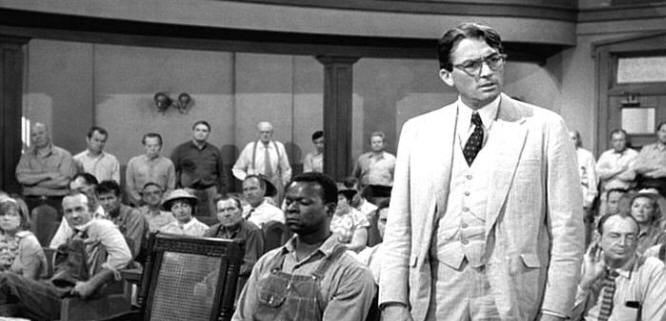
Murder, sex and racism - too much for a nine year old?
Last weekend I saw a great production of “To Kill a Mockingbird” at Second Story Theater in Warren, Rhode Island. In spite of myself, having read the book numerous times, I found myself hoping, even believing, that Tom Robinson would be acquitted. No such luck.I think the power of “Mockingbird” lies in its point of view – momentous events are seen through the eyes of a child. As such, they have much more power and effect than if they were presented from the point of view of some jaded adult.
But is this a story a kid can understand? Are their really kids like Scout – with so much fortitude and perception? What are they capable of processing?
After the play, I had a discussion with Janice Okoomian, a friend whose son was in the play (the kids were great – kudos to director Mark Peckham) and we talked about what elementary school-aged kids understood about the play. Initially, she watched her son Arek carefully as the play was in rehearsal, wondering how he would process and interpret the events portrayed– events which include murder, rape and the outward expression of a violent racism. She was unsure how much he would understand, and how much she would have to explain. How much should a kid know? Mark, the director, assured her after a couple of weeks of rehearsal that Arek “understood absolutely everything”. But even that presents a question – what does it mean to say he understood everything? Who does?
It left me thinking about what children can handle, and when they can handle it.
Arek is a bright kid, raised by very intelligent parents who treat him with respect. Thre’s a large amount of trust involved in letting a kid be in a play like “Mockingbird”. Still, it’s a lot for a nine or ten year old to handle. In that respect, Arek is a kid like Scout, growing up in the same environment as Scout – Atticus treats the children in his life with respect, dignity, and high expectations. In both cases, the children rise to the occasion, and are better for it.
But I’m thinking that a lot of this has to do with context – you don’t subject kids unnecessarily to gratuitous violence or cruelty, but when it happens, you make sure you’re there for them, helping to place those events and experiences in a broader setting. In the case of theater and story, the moral aspect of the work is incredibly important for a children’s understanding and ability to cope– one reason “Mockingbird” has such resonance with us is its incredible moral dimension. There is no outright victory for justice (a hard lesson for all of us), but there’s never a question of who the heroes are. This is not a cut and dried morality, either, but instead the difficult task of developing a sense of what’s important in life and standing up for it. In the case of “Mockingbird”, it’s Atticus’s explanation that “he couldn’t live with himself” if he didn’t defend Tom Robinson. Kids understand that much, and love Atticus for it – and they see what comes from acting on that belief. Being true to one’s self is no easy road, but Atticus Finch gives us a road map. I know more than one lawyer doing public service work who’s a lawyer because of Atticus Finch.
I also think that Arek and other kids like him (Scout included) will come to understand as much as they need to, and not more. When the pieces of the puzzle don’t fit together, they’ll make a new puzzle. Hopefully, with our help.
Exposing kids to this kind of experience and engaging in the following conversation is challenging and time-consuming. And it’s a totally different approach from that of a mother a librarian friend told me about – the mom was upset that her children were reading Captain Underpants, but willingly took her first grade daughter to see Twilight.
What’s wrong with that picture?
She was no Atticus Finch.
No comments:
Post a Comment